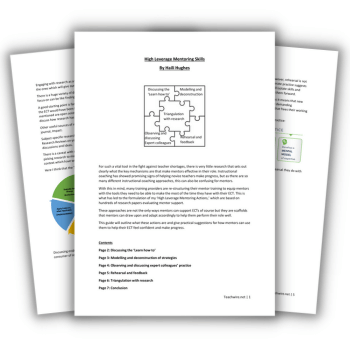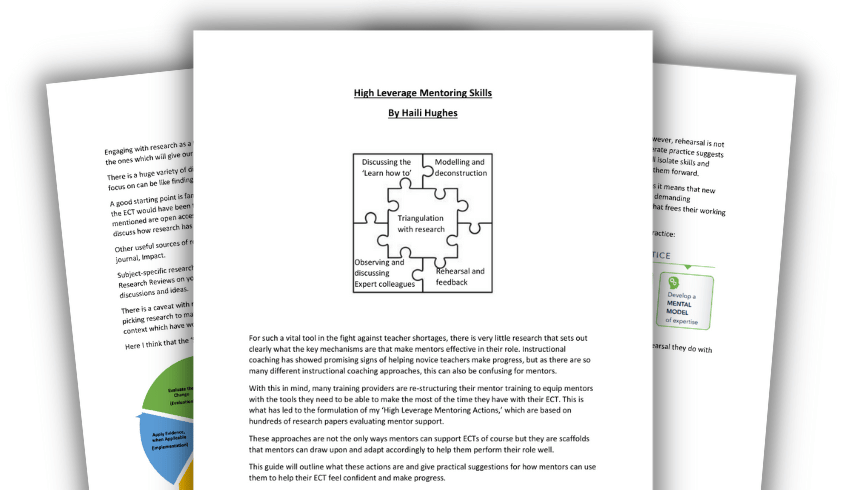Early Career Framework – Expert mentoring for novice teachers is vital

The Early Career Framework promises quality support and provision, but expert mentors are still essential, explains Haili Hughes…

- by Haili Hughes

Speak to anybody who has left the profession after a few years and, more often than not, they will cite a lack of support as one of the reasons they felt unable to continue as a teacher. This is why, when the Early Career Framework (ECF) was launched in 2021, I saw it as one of the most exciting developments in education for many years.
Mentoring matters – and a well-designed mentor training programme, facilitated by a knowledgeable, enthusiastic mentor makes a massive difference to an early career teacher’s pedagogical progress and feelings of success.
Key to teacher retention
It is what I have been banging the drum about for years. With teacher retention rates at a record low, this has never been more important.
The official figures tell us that one in three teachers leave the profession before they have seen out five years in the classroom. But anecdotally, almost every teacher I speak to lately is planning on leaving.
Even those who love their jobs feel unable to sustain their current workload long term.
“Almost every teacher I speak to lately is planning on leaving”
The Early Career Framework promised a quality of support and provision for all early career teachers, which looked like it might help to reverse some of these worrying figures.
It was the jewel in the crown of a range of reforms the DfE made as part of their Recruitment and Retention Strategy. These also included the introduction of the Core Content Framework as a prescribed ITTE curriculum, the ITT Market Review and a suite of new, specialised reformed NPQs.
These reforms were set to provide an evidence-informed ‘golden thread’ of teacher development, which aim to support teachers across their career.
What is the Early Career Framework?
The Early Career Framework programme aimed to improve the support package for new teachers by extending their funded training entitlement to a structured two-year package of high-quality professional development.
This followed on smoothly from the support and training that trainees were given in their ITE provision. Previously, it seemed like a bit of a gulf between training and then becoming a teacher, where sometimes contradictory advice and research was used.
This reformed three-year package aimed to bridge that gap.
The Early Career Framework reforms also aimed to increase the resources and improve the opportunities that are open to early career teachers by providing a comprehensive entitlement to what new teachers will need to learn about and how to learn about it during those first crucial years.
These statements are based upon the best available evidence of what makes great teaching. They make it clear that practices such as differentiating by learning objective or learning styles have been debunked. Indeed, they can actually be harmful to students, rather than helping them make progress.
It follows on from the Core Content Framework and contains sections on:
- behaviour management
- pedagogy
- curriculum
- assessment
- professional behaviours
The ‘Learn that’ statements are the same, but the CCF has an emphasis on receiving mentoring on how to teach strategies. Meanwhile, the Early Career Framework expects novice teachers to be able to enact the strategies themselves, with mentor support.
Both frameworks act as progression models for teachers across the three years. Early career teachers will ‘bump into’ some of the same content they have studied in their training year, in a spiral curriculum.
Internal and external training
The training materials were provided by lead providers, including:
- Ambition Institute
- Best Practice Network
- Education Development Trust
- National Institute of Teaching
- Teach First
- UCL Institute of Education
Most schools opted to go through a local delivery partner, such as a Teaching School Hub, who chose one of the providers.
Some schools, however, including some larger multi academy trusts, opted to provide their own in-house training. This then meant that they didn’t receive the funding.
In addition to the training materials and opportunities, new teachers would also be entitled to 10% of non-contact time in their first ECT year and 5% of their time away from their classrooms in year two to focus on their professional development. Schools retrospectively receive additional funding for this.
Dedicated mentor
But perhaps most significant was the allocation of a dedicated mentor to advise, support and guide the new teacher. This person would also receive training and professional development in order to help them fulfil their role successfully.
I was lucky enough to be invited to one of the Department for Education’s round tables when the policy was being refined and formulated. I was inspired by the hard work, research and dedication which had gone into its creation.
All sounds great, right? Yet, like any massive policy shift, there has been teething troubles, which a number of reviews have highlighted.
“Like any massive policy shift, there has been teething troubles”
Early Career Framework workload burden
In May 2022, the DfE conducted an evaluation of the roll out. It reported that while those questioned were positive about the provider-led Early Career Framework based training, they acknowledged that the new commitments had put more of a burden on workload. They stretched already tight time commitments for both mentors and ECTs.
In May 2023, Ofsted also published their ‘Professional Development Review,’ which found that the training is often inflexible and sometimes perceived to be poor quality. This was especially true when online, where there is a lack of opportunity for collaboration.
“They acknowledged that the new commitments had put more of a burden on workload”
A June 2023 review from Education Support and Public First suggested that the training contains lots of repeated material in the Early Career Framework from initial teacher training, with a lack of subject-specificity.
Again, this often added to high workloads. The report recommended that a review should consider how the content and delivery of both frameworks should be “reframed so that they are truly grounded in the realities of teachers’ working lives.”
Great in principle
Although this may all sound a bit like it has all gone wrong, I think there is no need to throw the baby out with the bath water.
In principle, I still think the Early Career Framework is a great idea. But of course there is more work that needs to be done, particularly with mentors.
“In principle, I still think the ECF is a great idea”
As I alluded to earlier, mentors have such an important role in supporting new teachers. More so than ever before, every school leader needs to acknowledge this. Mentors need the necessary time to dedicate themselves fully to the role.
In my job, I am privileged to speak to hundreds of mentors a week. Many of them are not being given any free periods to hold meetings or engage in training materials.
Indeed, some mentors are not even being released to attend the training. This is disappointing as no school leader would say that professional development is not important. Mentoring is absolutely a form of professional development for both ECTs themselves and their mentors.
Successful mentor training
Perhaps one thing which is stopping us from training mentors effectively is the lack of understanding about what great mentoring might actually look like.
In my book, Mentoring in Schools, I set out a manifesto for what mentors might do to help their mentee navigate the ECF.
Here I largely drew on mechanisms from an instructional coaching approach, influenced by both the work of Jim Knight and Paul Bambrick-Santoyo. Yet we need more research to affirm that this is the best approach.
Even the Mentor Standards, first published in 2015, now seem somewhat out of date. The role of mentor has been enhanced and become more about coaching novice teachers on particular instructional approaches.
The National Institute of Teaching is in the process of conducting research on mentoring. It’s identified that there is a great deal of variation in the types of activities reported by teachers within a mentoring relationship. This reflects the lack of consensus or specification of exactly what mentoring teachers should involve.
However, they identified three different styles of mentoring and coaching which seem to be prevalent in schools currently:
- Hierarchical-transmission
- Nonevaluative-developmental
- Collaborative-transformative
Cognitive science tells us that novices benefit from more direct instruction when they do not have the mental models developed to draw from in their long-term memory and solve problems.
Therefore, perhaps using a hierarchical-transmission style of mentoring might be appropriate with ITT trainees. However, it may not be as simple as that.
Responsive mentoring
Some trainees come into teaching having worked as teaching assistants or unqualified teachers for years or be career-changers.
As mentors, should we still treat these new teachers as empty cups that need to be filled up with the wisdom of expert colleagues? Obviously not.
This is why it is so important that we equip mentors with the mentoring and coaching skills that allow them to be responsive to their mentor’s needs.
What is clear though, is that mentors need to have certain qualities that can help their mentees to develop and flourish. Kerry and Mayes (1995) define some of these as:
- the ability to nurture and be a role model
- encourage and counsel
- focus on giving the mentee high quality professional development
- sustain a caring relationship over time
For me, this is still where the ECF comes into its own. These essential qualities of a successful mentor are made explicit in the very nature of the recommendations of what new teachers should learn.
“For me, this is still where the ECF comes into its own”
Evidence-informed research
What is great about the standards in the ECF is that the ‘Learn that’ and ‘Learn how to’ criteria are all based on evidence informed research. This means that new teachers know that they are doing the things which are going to make the biggest difference to the students in their care.
Presently, it can sometimes seem like there is a cultural and philosophical gulf between teachers and educational researchers. But this needn’t be the case.
It’s important that teachers explore what research has to offer them. The framework gives specific links for books and articles they can access to get them started.
Towards a new standard
As England’s only principal lecturer in mentoring and professional development, it has been my job to completely overhaul and strategically lead mentoring training for over a thousand mentors, in all phases, in my HE institution.
Obviously, relationships are a huge part of being a mentor. New teachers can’t take feedback from someone they don’t respect or trust.
However, for me mentor training needs to be about more than this. The ECF training has helped to re-focus mentor training, but we are still not there yet.
“New teachers can’t take feedback from someone they don’t respect or trust”
For years, a lot of mentor training consisted of what I might term the ‘nuts and bolts’ of mentor training. This is things like what paperwork to fill in and deadlines.
With a new focus on research-informed practice, it’s now also important that mentors are conversant and confident about the theories and approaches which underpin the ECF and CCF.
Like me, mentors may have trained a long time ago. Some of the approaches that were lauded as best practice have now been debunked.
It is key that vulnerable new teachers are not being confused by mixed messages from their training providers and the schools they are working in. This may lead to feelings of anxiety.
“Some of the approaches that were lauded as best practice have now been debunked”
Instead, there should be a purposeful integration, where mentors are able to bridge the gap between theory and practise and model the strategies in action.
Subject-specific focus
Another issue here though is the generic quality of the ECF. Mentor training needs to have a strong subject-specific focus. It also needs to be based on the substantive and disciplinary knowledge in that discipline.
For example, expositions in PE may look very different in an English lesson, or even in an EYFS classroom.
Finally, in the current mentor training, there is not enough training on actual mentoring and coaching skills. How many mentors have been trained to observe lessons well, or set granular targets, for example? Very few would be my guess.
For this training to have an impact however, we need to identify and define the key mechanisms for great mentoring. Hopefully the National Institute of Teaching’s research will help with this.
In the meantime, through reading hundreds of papers on coaching and mentoring, I’ve identified six high leverage mentoring actions which we have been using to train our mentors.
- Discussing the ‘Learn how to’ in generic and subject specific terms
- Modelling and deconstructing the active ingredients of strategies
- Observing, deconstructing and discussing expert colleagues’ lessons
- Rehearsal with expert feedback
- Triangulation with research
We’ve also used the work of Paul Bambrick-Santoyo to formulate a six-step feedback model. This helps mentors set granular targets that are subject specific and articulate the ‘how’ as well as the ‘what.’
This training and model acts as a scaffold for our mentors, rather than a straitjacket. We’ve seen them having a brilliant impact on the support our trainees are given. Ofsted recently recognised this too.

Download my Early Career Framework mentor guide.
Is instructional coaching the answer?
An instructional coaching approach suits the ECF perfectly. This is because it’s based around the idea of a teacher working with another trained expert to help them learn, adopt new teaching practices and provide feedback, while combining teaching and content expertise.
Nevertheless, there are many contested definitions of what instructional coaching might look like. Some ECF providers take more of a directive approach. On the other hand, others take the approach of two professionals working together where there is no hierarchical power dynamic.
Whatever approach people take, it needs to suit their context and be adapted throughout the two years mentors support ECTs. Of course, most great mentors will do this.
Although instructional coaching looks like a promising approach, we definitely need more research on whether this is the best approach for mentors to take with novice teachers.
For now, mentor training should focus on equipping mentors with the skills they need to perform their roles in a way that is flexible and doesn’t add to stress and workload.
Not an easy task. But one worth doing if we are to mitigate the teacher supply crisis we are currently facing.
Haili Hughes is a senior lecturer at the University of Sunderland and head of education at IRIS Connect. Follow her on Twitter at @hugheshaili. Visit her website here.
When ECT mentoring goes wrong
Teacher John Bolton calls attention to how some ECTs are falling victim to the darker side of teacher mentoring…
Official guidance is somewhat nebulous regarding the role of ITT/ECT mentors, currently defined as “Providing or brokering effective support”.
For many new teachers, however, even this loose description falls wide of the mark. My own NQT mentor – let’s call her Ruth – expected me to have emerged from my training as a seasoned practitioner.
Early on, she took umbrage with my assessment of a unit of work. She unveiled a mark scheme she’d created – which until then I didn’t even know existed – berated me for not following it, and proceeded to change numerous grades to what she believed those students should have achieved.
When I followed Ruth’s example, and made similar adjustments at the end of the next unit, she reprimanded me.
Ruth made my life a misery by belittling and bullying me. She even sent members of her Y11 tutor group into my lessons to watch me teach and report back to her.
I grew to fear her, and would tiptoe past her office each night to avoid her. She very nearly put me off teaching altogether. It was only when I took on the running of a Facebook group for trainee teachers that I realised I wasn’t alone.
A common problem
The DfE’s Core Content Framework vows – no fewer than 18 times – to give trainees “Clear, consistent and effective mentoring”, but its execution is inconsistent.
Many members of the aforementioned Facebook group have opened up to me about their own experiences, describing mentors who are “Constantly making digs”; who “Give no feedback or targets”; who never look at lesson plans, and are “Negative and generally disinterested”.
One trainee told me about her mentor, who we’ll call Tony: “My mental health and confidence were destroyed… he made me into a shy, cowering, weak person and was, quite frankly, a bully.”
She went on to recall how Tony, “Always wrote pages of feedback about how awful I was, but never offered anything in the way of support.”
Lesson observations should be discussed regularly, and involve regular constructive feedback, yet I’ve seen many trainees describe a lack of meetings and singularly negative feedback.
Some have revealed that their mentors fail to hold regular meetings, instead ‘faking paperwork’ and replying to questions with, ‘Google it.’
Even when a mentee has the courage to speak out, who can they turn to? ECTs are assigned an induction tutor and designated mentor, but existing DfE guidance allows for both roles to be held by the same individual.
One ECT said they had nobody to talk to about their issues because their mentor was the deputy head and their induction tutor was the headteacher. Who also happened to be husband and wife.
A bleak outlook
According to DfE data, 8% of trainees weren’t awarded QTS3 during the 2022/23 academic year. Even among those who successfully completed their ITT and achieved QTS, 24% were expected to have left teaching before finishing their induction period.
I personally believe that a notable proportion of ECTs are abandoning the profession due to negative mentoring experiences.
The profession continues to struggle with a teacher shortage, but certain elements within it are throttling the pipeline.
The Early Career Framework promises funded time for mentors to support ECTs, as well as funded mentor training – but as reported by Schools Week, some schools have insisted that they can’t afford to release teachers for the amount of time required.
With both NASBTT and UCET calling for Ofsted to suspend inspections of ITT providers – a cycle which only happens once every six years as it is – it doesn’t seem as though the problem will be solved any time soon.
A certain set of skills
Defending poor mentoring by pointing to a lack of resources and funding can only go so far, however. Being a mentor requires a distinct skillset and personality traits that not everyone possesses.
In the school where I teach now, mentoring is a positive, progressive experience grounded in mutual respect, but the scars of past experiences run deep.
In their book, Mentoring and Coaching in Education, Lizana Oberholzer and Derek Boyle describe a great mentor as someone who can demonstrate self-reflection, humility, empathy, and patience, and suggest that every teacher and leader should try their hand at mentoring as part of their professional development.
Well, I agree with that first part, at least.
John Bolton is a primary and secondary school teacher, and former freelance education writer.







